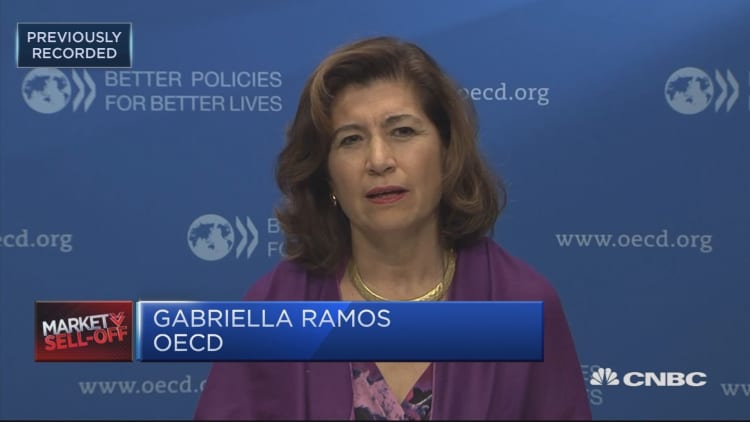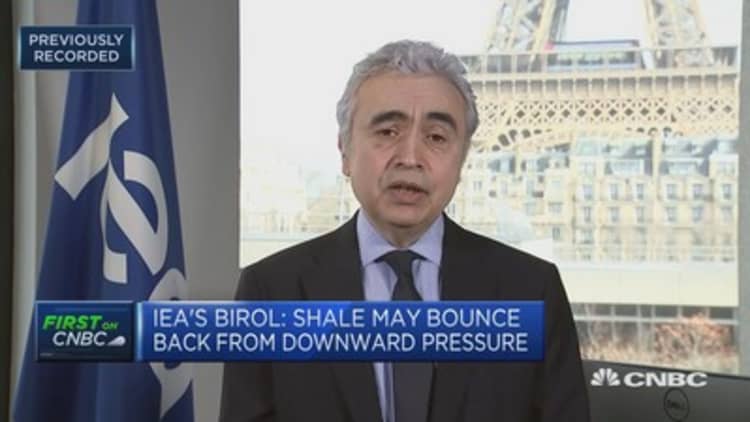A range of banks and financial institutions have offered their worst-case scenarios for 2020, as the spread of the new coronavirus impacts the global economy and roils financial markets.
The global uptick in gross domestic product (GDP) could be as low as 1% this year, the Institute for International Finance (IIF) said last week, and that prediction was even before an oil price crash on Monday sent stocks into another tailspin.
"A global recession is now all but certain," Rabobank said Tuesday, while predicting global growth to hit 1.6% of GDP by the end of the year.
The world economy grew 2.9% in 2019, according to estimates from the International Monetary Fund.
The number of people infected with the coronavirus has surpassed 114,000 worldwide. The virus that started in China late last year is having consequences for all major economies with flight cancellations, panic buying and strict quarantine measures in some cases.
"The range of potential outcomes is large and depends on the spread of the virus and resulting economic fall-out, all of which are highly uncertain at this stage," the IIF, an association of financial institutions, said in its report Thursday.
"Global growth could conceivably approach 1.0%, far below the 2.6% last year and the weakest since the global financial crisis," the IIF said.
The Organization for Economic Cooperation and Development (OECD), the ratings agency Moody's and other financial institutions have also downgraded their global growth forecasts over the last few days. The OECD estimated that global GDP will be 2.4% this year, a 0.5% percentage point cut from a forecast done in November. Moody's revised down its GDP expectations for the global economy Friday to 2.1%, from 2.4%.
"Previously, we assessed the effects of the virus mainly on aggregate demand in China, global travel and global factory output resulting from disruptions in supply chains through East Asia," Moody's said in a note.
"It is now clear that the shock will additionally dampen domestic demand globally, which will affect a wide range of non-traded activities across countries and regions simultaneously," the ratings agency added.
More people are working from home as the virus spreads to new countries and governments issue new advice. Some people in Europe are taking less trips on public transport and avoiding public spaces, such as museums, restaurants and movie theaters.
"We have cut our 2020 global growth forecast to 2.8%. This would be the lowest reading since 2009," Bank of America said two weeks ago.

Meanwhile, Nomura economists have warned that a global recession might be inevitable.
"This is an abnormal global economic slump. The most effective immediate policy response is not monetary or fiscal policies; it's health security controls. If health security controls fail to contain the spread of COVID-19, financial markets may soon have to accept that a global recession is a forgone conclusion," the bank said in a note Thursday.
Oil prices add pressure on global growth
However, economists admit that any forecasts at this stage have a high degree of uncertainty.
"There are two main ways in which the damage might be bigger than we expect. First, the virus itself might spread more widely than we have assumed. And second, even if our assumptions about the virus are broadly right, the economic fallout might be bigger than we think," the research firm Capital Economics said last week.
Oil prices have plunged more than 20% on Monday — their worst performance since 1991 — amid divisions between Russia and Saudi Arabia over production cuts. This could add further pressure on the global economy and lead to further downward revisions.
"The oil price plunge makes things even worse for global GDP in the near term, as those who are hurt by the drop in oil prices (i.e. producers) typically react to the pain faster than those who benefit from it (i.e. consumers)," Konstantinos Venetis, senior economist at the research firm TS Lombard, said Monday.
Athanasia Kokkinogeni, Europe senior analyst at the research firm Duckier Frontier, said "the oil price slump will produce winners and losers depending on whether a country is a net oil importer or a net oil exporter respectively. However, the effects of the coronavirus outbreak will offset any positive economic effects for the net oil importers, whilst it will exacerbate the negative economic effects for the net oil exporters."





